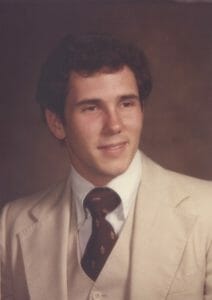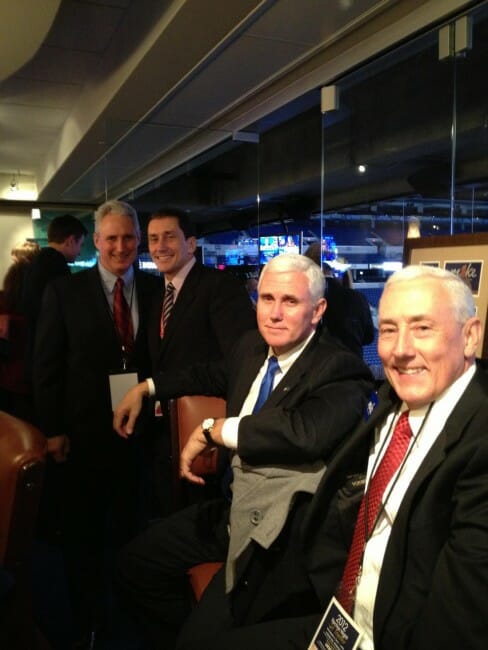Mike Pence's 'Comeback Story' After He Chose His Commitment to 'God Above All Things'
This article was sponsored by “The Faith of Mike Pence.”
In November 1990, no one could have predicted Mike Pence’s rise to the pinnacle of American political power, including the future vice president himself.
Pence had just lost his second bid in as many elections to replace incumbent Democratic Rep. Phil Sharp in Indiana’s 2nd Congressional District, but what really broke the challenger’s heart is how he had allowed raw political ambition to push to the side his walk with Jesus Christ.
Leslie Montgomery — author of “The Faith of Mike Pence” — told The Western Journal this defining moment in the future political leader’s life is her favorite to tell in her new book.
“The reason why I love it is because of Romans 8:28,” Montgomery said.
The popular Bible verse reads: “And we know that for those who love God all things work together for good, for those who are called according to his purpose.”

“Mike Pence really messed up in the second campaign,” said Montgomery, who also wrote “The Faith of Condoleezza Rice.”
“He went negative,” she said. “He put his faith aside, which he admitted to, and he followed Washington consultants’ advice instead of doing it God’s way. And he lost that campaign.”
Going into the race, Pence’s prospects looked good.
In 1988, the then 29-year-old newcomer had shocked Indiana political insiders by handily winning the Republican primary (having never run for political office before) and then nearly defeating seven-term incumbent Sharp, taking 47 percent of the vote.
For his second run against Sharp in 1990, the Pence campaign brought in some political consultants from Washington, D.C., to help put their candidate over the top.
“They advised him to eliminate all one-on-one campaigning, focus on television and radio ads, and go hard after Phil Sharp this time around,” Montgomery wrote in her book.
Longtime friend and Pence campaign adviser Jay Steger thought that was a major strategic mistake.
“I said to him, ‘These guys are not playing to your strengths. You just need to be you and people will like you,'” Steger said.
When the campaign did not change course, Steger decided to step down from his role as adviser.
Sharp trounced Pence by 19 percentage points.
“He went through a dark period of time for a few months,” Montgomery told The Western Journal. “God really challenged him and asked him, ‘What kind of leader do you want to be? What kind of man of God do you want to be?'”
“Mike Pence came out of that time a different man,” she said. “He came out of that a man who was wholly committed to God above all things. He said, ‘I will never compromise. I will always put God first and foremost.'”
Pence had told his future wife, Karen, back when he was a law student in the mid-1980s that he felt God had called him to public service, and she was fully on board with that direction for their lives.

Now where their road would take them was unclear, but they leaned on their faith that God still had a plan and remained sovereign.
Pence took a position as head of the Indiana Policy Review Foundation, a conservative think tank.
Among was his first acts was to pen a piece titled “Confessions of a Negative Campaigner” for the foundation’s journal.
“A campaign ought to demonstrate the basic human decency of the candidate,” Pence wrote. “A campaign ought to be about the advancement of issues whose success or failure is more significant than that of the candidate.”
The essay ended up finding a nationwide audience, likely because of the would-be politician’s candor and contrition.
“I was very thankful and relieved when Mike did his very public apology,” Indiana political veteran Ed Simcox said. “When he took stock after the dust settled, he saw it for what it was and it troubled him and clashed with his spirit. I never doubted his faith and I knew he was a sincere believer, but I also believe ambition at a certain point overrode moral constraint.”
Consistent with his Christian faith, Pence not only repented before God but also took the additional and very unusual step in the political world of apologizing directly to his opponent Sharp.
“Mike Pence allowed God to take his sin, his mess-up, and be glorified through it,” Montgomery said.
Pence would spend the next decade in the political wilderness. This period is reminiscent of a pattern in the lives of many leaders — such as Abraham Lincoln in the 1850s, Franklin Roosevelt in the 1920s and Winston Churchill in the 1930s — whose early political promise and dreams appeared destined to go unfulfilled.
Historians point to these character-refining seasons as essential to the leaders’ ability to persevere through very challenging times when they reentered the arena.
In 2000, Pence would run again for Congress and win. In 2009, his House colleagues chose him to be chairman of the Republican Conference, the third highest-ranking position in the GOP caucus.
Pence then successfully ran to be the Hoosier State’s 50th governor in 2012 and later vice president in 2016.

“‘The Faith of Mike Pence‘ is a comeback story, not just personally and politically, but spiritually,” Montgomery said.
“There is absolutely no Mike Pence without his faith,” she said. “His faith is the core of who he is, and everything else springs out of that.”
“The Faith of Mike Pence” by Leslie Montgomery releases Aug. 6, 2019. Pre-order your copy by clicking here.
Sponsored content is a service paid for by an advertiser and produced by Liftable Media.
Truth and Accuracy
We are committed to truth and accuracy in all of our journalism. Read our editorial standards.
Advertise with The Western Journal and reach millions of highly engaged readers, while supporting our work. Advertise Today.











